 Convert, it's urgent! “I don't get tired as long as I have life, as long as Christ keeps me alive, I will shout, I will always shout: Brothers, please convert! Brothers, please convert, it's urgent! Don't waste time, it's urgent! Because many are waiting for great events little by little. No! The great events are going to happen in a short period, of days! All of them! And the Warning will come! [...] Let's trust in the word of Christ, and let's ask the Holy Spirit for discernment so as not to make wrong decisions" –Luz de Maria.
Convert, it's urgent! “I don't get tired as long as I have life, as long as Christ keeps me alive, I will shout, I will always shout: Brothers, please convert! Brothers, please convert, it's urgent! Don't waste time, it's urgent! Because many are waiting for great events little by little. No! The great events are going to happen in a short period, of days! All of them! And the Warning will come! [...] Let's trust in the word of Christ, and let's ask the Holy Spirit for discernment so as not to make wrong decisions" –Luz de Maria.(S724) Make the Sign of the Cross before to start reading
§1: The world is marching towards its doom…
§2: My Children, be many not to abandon Me…
§3: At the altar the Holy Sacrifice is repeated, identical…
§4: Be vigilant, be on your guard…
§5: Do not miss Sunday Mass any longer…
§1
«My dearest Children, My Soul is in pain because the world is marching towards its doom. Men disregard My Teaching, My warnings, My Presence with them.

On the whole, they despise, reject and abandon Me. Even many of My priests no longer know Me, and I am alone, left alone in My Agony, left alone in My Passion and abandoned on My Cross.
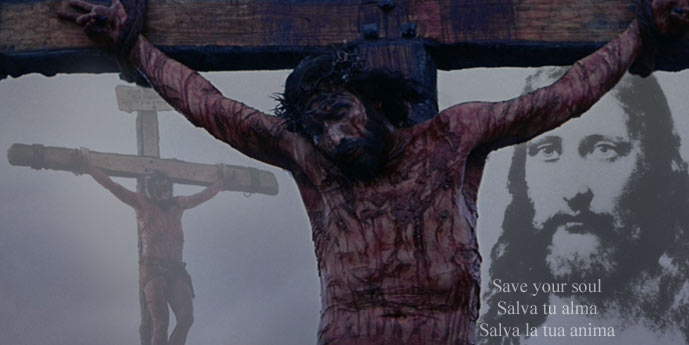
My Mother, Saint John and the holy women did not abandon Me, they assisted Me, they listened to My last words and My Mother received Me on her knees when I came down from the Cross.
§2
My very dear Children, be many to assist Me, not to abandon Me, to stay with Me. I am always on the Cross, throughout the life of the world, because at every holy Mass, My Sacrifice is renewed. At every holy Mass, I offer Myself to My Heavenly Father for the forgiveness of mankind, yours, and if you attend Mass as the holy women and as St. John attended My Crucifixion, you will enter My Heaven at the end of your days.
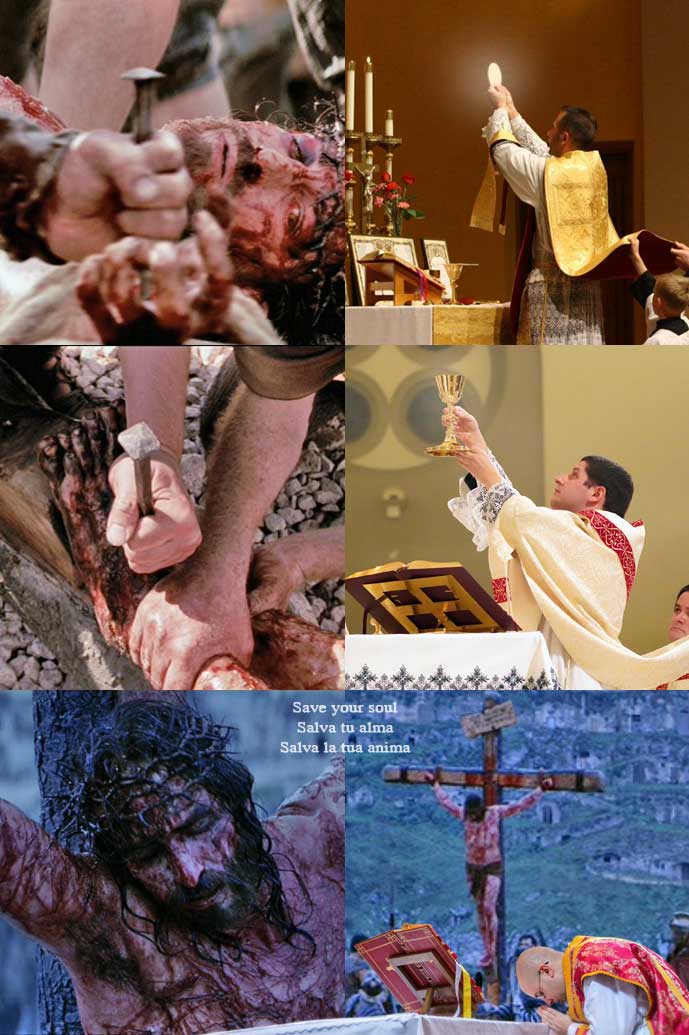
My people did not laugh or chatter during those 3 hours of great suffering, no, they were stretched out towards Me, praying and weeping, and contemplating Me because, yes truly, that hour was poignant and so impressive.
The sky darkened, night fell upon the earth, the curtain of the Temple was torn from top to bottom, earthquakes split the rocks, tombs were opened, and terror seized all those around. The centurion and the guards were terrified, and said, “Truly this man was the Son of God” (Mt 27:54).
None of My bones were broken, just as none of the bones of the Jewish Passover lamb were broken: I was truly the Paschal Lamb, crucified and offered for the redemption of all men.
§3
Think of this, meditate on this at every Mass, and know that at the altar the Holy Sacrifice is repeated, identical.
It is the same Sacrifice, the same offering to My Heavenly Father, the same gift of all Myself that I never cease to offer through the hands of the priest who, at the altar, is another Christ, the unique Christ, I, the Lord Jesus.
He says: “this is My Body, this is My Blood”, he says nothing else and, on the Cross, I finished emptying Myself of My Blood. The last drop was that of My Sacred Heart, pierced by the lance, which, with the water, showed how much My Sacrifice was the burial of all the sins of the world, their forgiveness, their cleansing. Yes, through My Sacrifice and the Sacrament of Baptism, I make all souls white and beautiful, pure and noble, and some saints have kept it so, immaculate and sanctified.
§4
Be holy, My dearest Children, be vigilant, be on your guard, for the Evil One prowls and no man is safe. He is an insinuator, a liar, a rogue, a thief, a murderer.
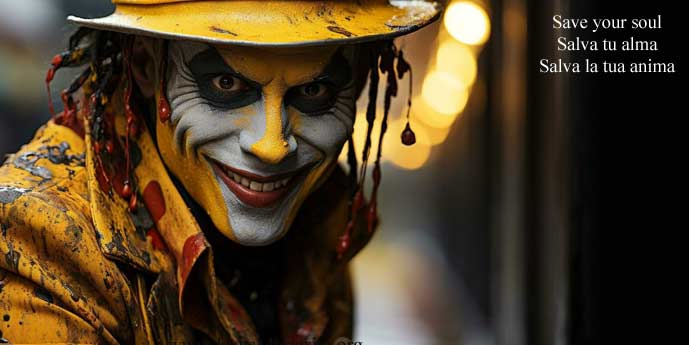
If he promises you wealth in exchange for your person, know that in hell you will be infinitely, totally, miserably poor.
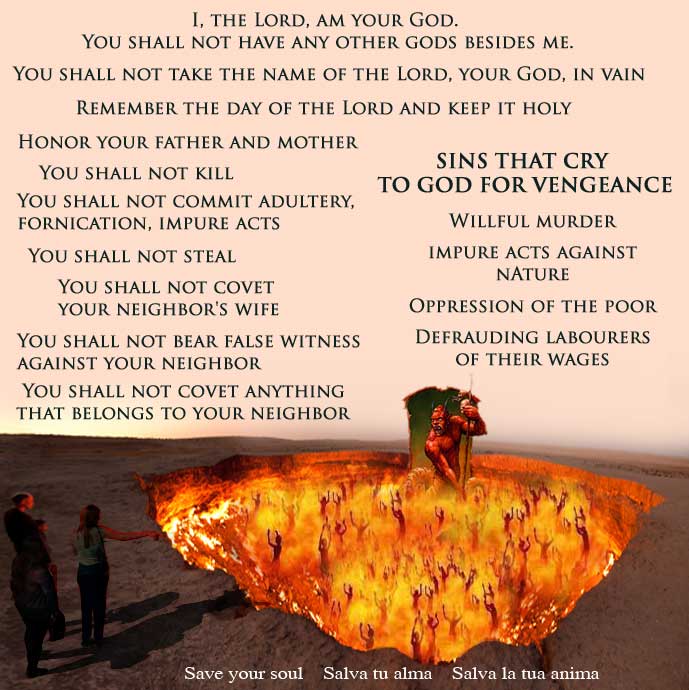
The wealth he promises you will not follow you to hell, where you will be stripped of everything – your possessions, your personality, your body – because the damned will have no part in the General Resurrection of bodies [1].
The Resurrection of bodies is an immense grace, and the Lord, the Holy of Holies, has shown you the path you must follow to share as He does in all Heavenly Graces.
§5
My children, do not miss Sunday Mass any longer, God’s Commandments oblige you to do so: “On the Lord’s Day keep, serving God devoutly.”
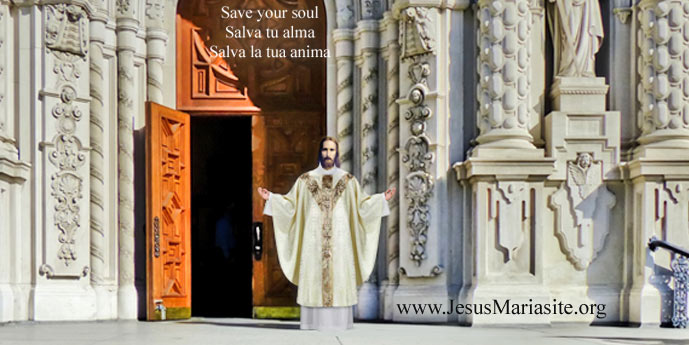
The Lord’s Day is Sunday, and that is the day you must keep. Saturday night is not Sunday, and God’s Commandments cannot be changed by man.
Love God, obey Him, desire Him, adore Him.
I bless you, My dear Children, I love you and I want you to be holy.
In the Name (+) of the Father, the Son and the Holy Spirit. So be it.
Il vostro Signore e il vostro Dio.»
- Catechism of the Catholic Church, Article 11:
“I Believe the Resurrection of the Flesh”The meaning of Christian death:
- 1010 – Thanks to Christ, Christian death has a positive meaning. “For me to live is Christ and to die a gain” (Phil. 1:21). “Certain is this word: if we die with him, we shall also live with him” (2 Tim. 2:11). Herein lies the essential novelty of Christian death: through Baptism, the Christian has already sacramentally “died with Christ,” in order to live a new life; and if we die in Christ’s grace, physical death consummates this “dying with Christ” and thus accomplishes our incorporation into him in his redemptive act.
- 1013 – Death is the end of man’s earthly pilgrimage; it is the end of the time of grace and mercy that God offers him to fulfill his earthly life according to the divine plan and to decide his ultimate destiny. When the one course of our earthly life is over, we will not return to live any more earthly lives. “It is appointed for men to die only once” (Heb. 9:27). There is no “reincarnation” after death.
- 1014 – The Church encourages us to prepare for the hour of our death (“From sudden death, deliver us, Lord”: ancient Litany of the Saints), to ask the Mother of God to intercede for us “at the hour of our death” (Hail Mary) and to entrust us to St. Joseph, patron of the good death.
In summary:
- 1015 – “The flesh is the hinge of salvation.” We believe in God who is the Creator of the flesh; we believe in the Word made flesh to redeem the flesh; we believe in the resurrection of the flesh, the fulfillment of creation and the redemption of the flesh.
- 1016 – With death the soul is separated from the body, but in the resurrection, God will return to give incorruptible life to our transformed body, reuniting it with our soul. As Christ rose and lives forever, so we will all rise again on the last day.
- 1017 – “We believe […] in the true resurrection of the flesh that we now have.” While, however, a corruptible body is sown in the grave, an incorruptible body, a “spiritual body,” is resurrected (1 Cor. 15:44).
- 1018 – As a result of original sin, man must suffer “bodily death, from which he would have been exempt if he had not sinned.”
- 1019 – Jesus, the Son of God, freely underwent death for us in total and free submission to the Will of God, His Father. By His death He conquered death, thus opening to all people the possibility of salvation.
- The Third Commandment:
“Remember the Sabbath Day (the Lord’s Day) to keep holy”- (Mark 16: 9-10): When he had risen, early on the first day of the week, [Jesus] appeared first to Mary Magdalene. She went and told his companions who were mourning and weeping.
- (Matthew 28: 1-2): “After the sabbath, as the first day of the week was dawning, Mary Magdalene and the other Mary came to see the tomb. And behold, there was a great earthquake; for an angel of the Lord descended from heaven, approached, rolled back the stone, and sat upon it.”
- (John. 20: 1, 14-15 ): “On the first day of the week, Mary of Magdala came to the tomb early in the morning, while it was still dark, and saw the stone removed from the tomb. […] she turned around and saw Jesus there, but did not know it was Jesus.Jesus said to her, “Woman, why are you weeping? Whom are you looking for?”
Warning:
- The Lord Jesus rose on the day after the Sabbath (a day of rest observed by the Jewish people), which is why Sunday for Catholics is the day of the Third Commandment, “Remember the Sabbath Day, to keep it holy.”
- Vespers Mass or Saturday evening Mass…be careful not to abuse it: “Sunday is the Lord’s Day: “In recent times there is a growing tendency to attend Saturday evening Mass in place of Sunday Mass. However, one must be careful not to abuse this option. That of taking part in the Vespers Mass, commonly called “prefestival” Mass, as a substitute for Sunday Mass is a tendency that many faithful tend to abuse. To better understand this concept, we need to go back to the reasons why this was introduced and, above all, rediscover the actual circumstances under which this opportunity was given.
- Vespers Mass, it was Pius XII who introduced it: The Vespers Mass was introduced by Pope Pius XII through two decrees: The Constitution Christus Dominus of January 6, 1953 and the Motu porprio: “Sacram Communionem” of March 19, 1957. Through these two decrees, the then Pontiff also introduced another important novelty: the reduction of the Eucharistic fast to three hours. A few years later, in 1972, the Italian bishops, during the pontificate of Paul VI, established that Sunday and festive Mass could be brought forward to the previous day.
- The bishops explained when one can anticipate: But, in this regard, one must keep in mind, with extreme care, the recommendations that the bishops dictated in that year. IIndeed, the College of Bishops recommended not to make use of the Prefestival Celebration unless there were “serious family or professional reasons“. So, it is good to make use of this possibility granted, only in the case of serious reasons and unpostponable commitments, which make Sunday participation impossible. (Source: lalucedimaria.it)
Fonte srbeghe.blog

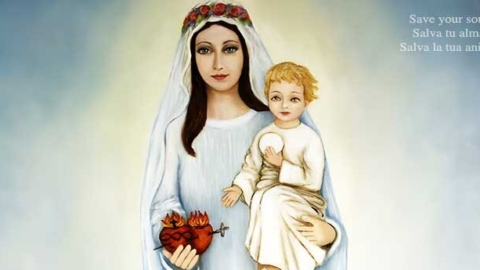
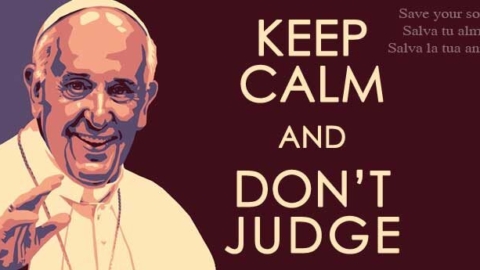
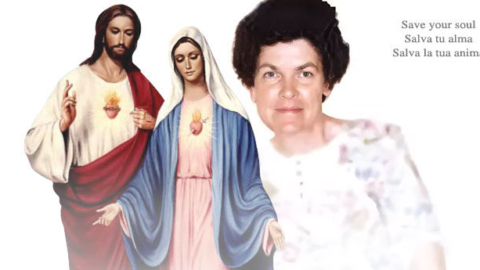






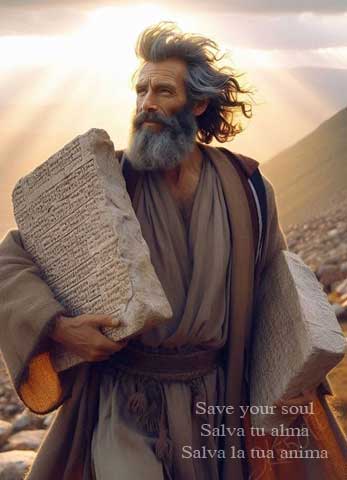
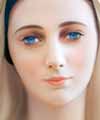 "If you knew how you shine after duly approaching the Sacrament of Confession. "Jesus is in the Confessional and He hears every word, sees into every corner of your heart and Is eager to bestow the graces inherent in His Forgiveness.
"If you knew how you shine after duly approaching the Sacrament of Confession. "Jesus is in the Confessional and He hears every word, sees into every corner of your heart and Is eager to bestow the graces inherent in His Forgiveness.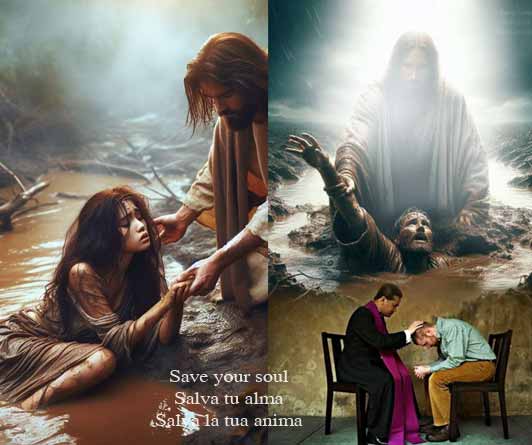
 "I ask to end to this abomination! No more of extraordinary Ministers of the Eucharist, no more of Communions in the hand!"
"I ask to end to this abomination! No more of extraordinary Ministers of the Eucharist, no more of Communions in the hand!"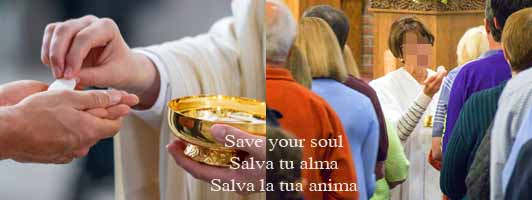
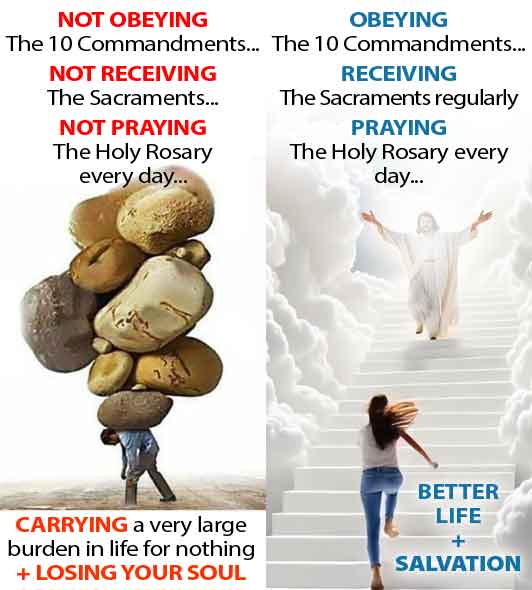
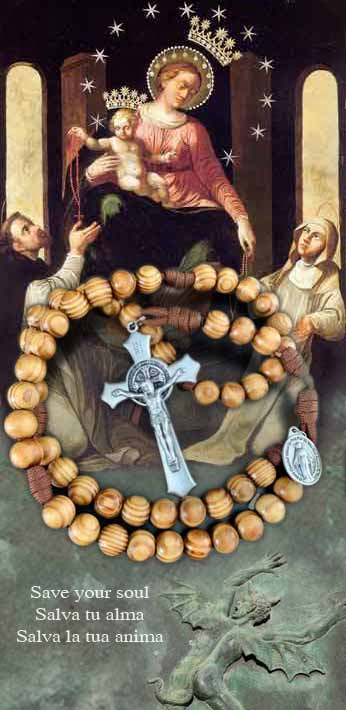
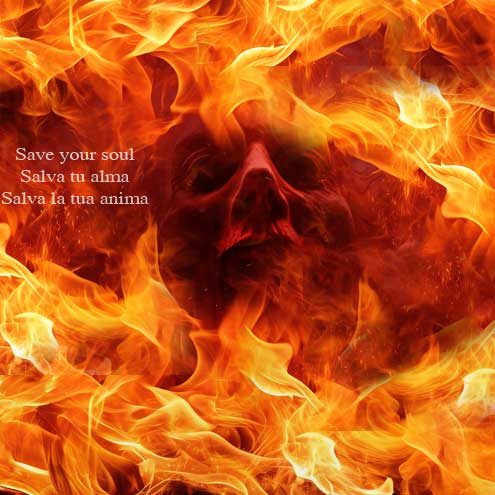
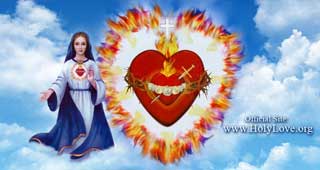
 "Heavenly Father, today, I surrender to You my heart. Help me to be Your instrument in the world. Cover me with the Precious Blood of Your Divine Son. Guard me against all evil. Protect me from any evil plan Satan may have for me today. Clothe me in Your Divine Will. Amen"
"Heavenly Father, today, I surrender to You my heart. Help me to be Your instrument in the world. Cover me with the Precious Blood of Your Divine Son. Guard me against all evil. Protect me from any evil plan Satan may have for me today. Clothe me in Your Divine Will. Amen" "Oh Jesus of Divine Mercy, hear my pleadings to you, for I am here to do your Will!"
"Oh Jesus of Divine Mercy, hear my pleadings to you, for I am here to do your Will!"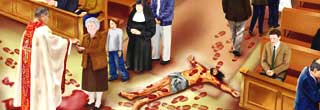
 "I place myself in the presence of the Most Holy Trinity (Father, Son, and Holy Spirit) and by the power of the Blood of Our Lord Jesus Christ, I break, undo, trample, annihilate, render ineffective, and erase from my physical, psychic, biological, and spiritual being every curse that has been placed on me, on my family and family tree, on any person, family member, or ancestor through acts of occultism or spiritism. By the power of the Precious Blood of Our Lord Jesus Christ and through the intercession of the Blessed Virgin Mary, St. Michael, St. Gabriel, and St. Raphael, I break and render ineffective every curse, whatever its nature, in the Name of our Lord Jesus Christ. Amen (Repeat the prayer 3 times)"
"I place myself in the presence of the Most Holy Trinity (Father, Son, and Holy Spirit) and by the power of the Blood of Our Lord Jesus Christ, I break, undo, trample, annihilate, render ineffective, and erase from my physical, psychic, biological, and spiritual being every curse that has been placed on me, on my family and family tree, on any person, family member, or ancestor through acts of occultism or spiritism. By the power of the Precious Blood of Our Lord Jesus Christ and through the intercession of the Blessed Virgin Mary, St. Michael, St. Gabriel, and St. Raphael, I break and render ineffective every curse, whatever its nature, in the Name of our Lord Jesus Christ. Amen (Repeat the prayer 3 times)"  "O glorious St. Joseph! by your profound humility, by your unalterable meekness, by your invincible patience, by your angelic purity and perfect fidelity that made you a timely imitator of the virtues of Jesus and Mary, I ask you to console me in all my sorrows, to guide me in all my doubts, to defend me in all temptations, to deliver me from all spiritual and material dangers; to extend your arm against all my visible and invisible enemies, breaking and destroying all the snares and barriers that they tend and arm against me. Amen."
"O glorious St. Joseph! by your profound humility, by your unalterable meekness, by your invincible patience, by your angelic purity and perfect fidelity that made you a timely imitator of the virtues of Jesus and Mary, I ask you to console me in all my sorrows, to guide me in all my doubts, to defend me in all temptations, to deliver me from all spiritual and material dangers; to extend your arm against all my visible and invisible enemies, breaking and destroying all the snares and barriers that they tend and arm against me. Amen."  "Oh, blessed Saint Michael, protect us from the attacks and snares of the evil spirits because you know full well that we are poor mortals, fragile and weak, in need of the Mercy of God and of your protection to fulfill the mission that Heaven has commissioned to us. Oh, Saint Michael, may your victorious cry: “who is like God? no one is like God”, suppress and cast into Hell satan and all the evil spirits who prowl about the world seeking the destruction of souls. Amen"
"Oh, blessed Saint Michael, protect us from the attacks and snares of the evil spirits because you know full well that we are poor mortals, fragile and weak, in need of the Mercy of God and of your protection to fulfill the mission that Heaven has commissioned to us. Oh, Saint Michael, may your victorious cry: “who is like God? no one is like God”, suppress and cast into Hell satan and all the evil spirits who prowl about the world seeking the destruction of souls. Amen"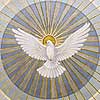 Come, Holy Spirit, send to us from Heaven a ray of your light. Come, Father of the poor, come, giver of gifts, come, light of hearts. Perfect comforter, sweet guest of the soul, sweetest relief. In toil, rest, in heat, shelter, in weeping comfort. O most blessed light, invade into the depths the hearts of your faithful. Without your strength nothing is in man, nothing is without fault. Wash what is sordid, bathe what is parched, heal what bleeds. Bend that which is stiff, warm that which is icy, straighten that which is astray. Give to your faithful who trust in you alone your Holy Gifts. Give virtue and reward, give holy death, give eternal joy. Amen.
Come, Holy Spirit, send to us from Heaven a ray of your light. Come, Father of the poor, come, giver of gifts, come, light of hearts. Perfect comforter, sweet guest of the soul, sweetest relief. In toil, rest, in heat, shelter, in weeping comfort. O most blessed light, invade into the depths the hearts of your faithful. Without your strength nothing is in man, nothing is without fault. Wash what is sordid, bathe what is parched, heal what bleeds. Bend that which is stiff, warm that which is icy, straighten that which is astray. Give to your faithful who trust in you alone your Holy Gifts. Give virtue and reward, give holy death, give eternal joy. Amen.
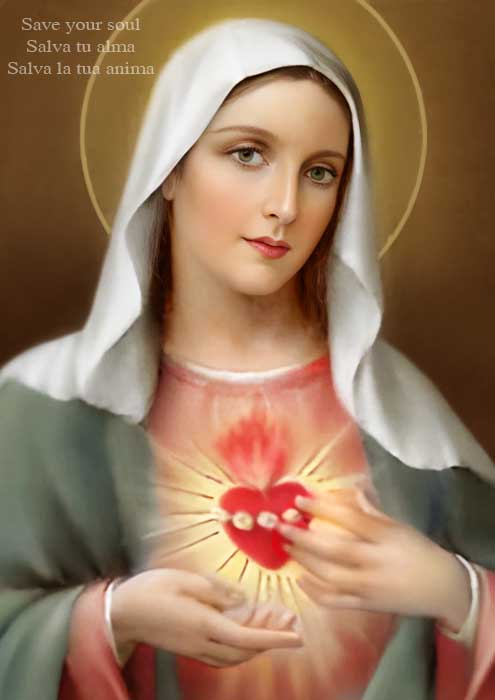
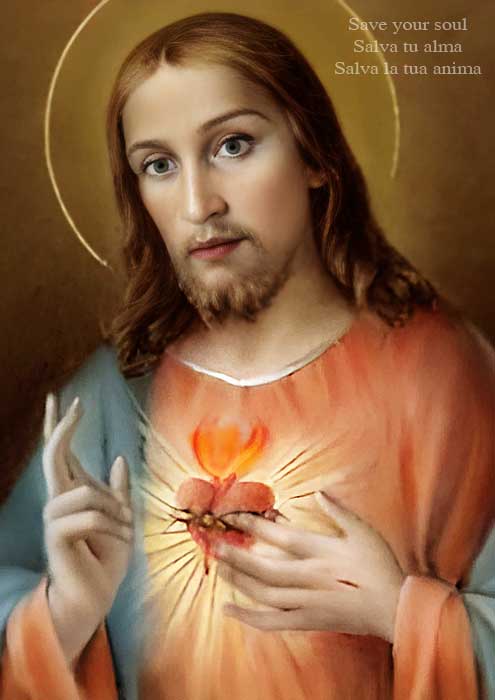
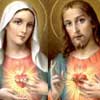 "O Hearts of Jesus and Mary; I consecrate myself, I consecrate my family and the whole world, to your Most Beloved Hearts. Listen to the supplication which I making to you and accept our hearts in Yours, to be delivered and protected we, the whole world, from all evil and all sin. May the protection of your Two Hearts be refuge, strength, and protection, in the daily spiritual struggles. That the power of your Two Hearts irradiates the world so that it is protected from evil and sin. We willingly consecrate ourselves and consecrate all mankind to your Hearts; sure and confident, for your Great Mercy, to obtain the victory over the forces of evil in this world, and the eternal Glory in the Kingdom of God. Amen"
"O Hearts of Jesus and Mary; I consecrate myself, I consecrate my family and the whole world, to your Most Beloved Hearts. Listen to the supplication which I making to you and accept our hearts in Yours, to be delivered and protected we, the whole world, from all evil and all sin. May the protection of your Two Hearts be refuge, strength, and protection, in the daily spiritual struggles. That the power of your Two Hearts irradiates the world so that it is protected from evil and sin. We willingly consecrate ourselves and consecrate all mankind to your Hearts; sure and confident, for your Great Mercy, to obtain the victory over the forces of evil in this world, and the eternal Glory in the Kingdom of God. Amen"